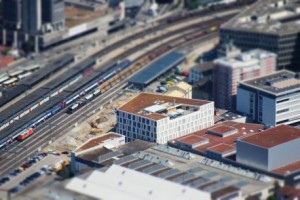The ENSI
ENSI as a regulatory body
 On 21 August 1964, the Federal Council decided to form a Section for the Safety of Atomic Installations (SSA).
On 21 August 1964, the Federal Council decided to form a Section for the Safety of Atomic Installations (SSA).
As of 1 January 1973, the SSA was converted into the Division for the Safety of Nuclear Installations (ASK). In 1982, the ASK became the Principal Nuclear Safety Division (HSK). Since 1 January 2009, the Federal Nuclear Safety Inspectorate (ENSI) has supervised the safe and secure operation of nuclear installations in Switzerland.
As an independent body constituted under public law, ENSI reports directly to the Federal Council. ENSI is the successor to the Principal Nuclear Safety Division (HSK) within the Swiss Federal Office of Energy (SFOE). ENSI’s headquarters are located at Brugg in the canton of Aargau. The decision to make the HSK independent and convert it into a Federal body constituted under public law was taken on 22 June 2007 when the Swiss parliament passed the ENSI Act. The key factors that prompted this change were the requirement in the international Convention on Nuclear Safety for safety authorities to be independent and the provisions of the Swiss Nuclear Energy Act.
ENSI is supervised by the ENSI Board, which is elected by the Federal Council and reports directly to the Council.
The supreme objective of Federal supervisory activities in the nuclear energy sector is to protect people and the environment against the risks pertaining to the peaceful use of nuclear energy. ENSI supervises the five nuclear power plants in Switzerland, the interim radwaste storage facilities and the nuclear research installations at the Paul Scherrer Institute (PSI), the Swiss Federal Institute of Technology in Lausanne (EPFL) and the University of Basel. This supervision entails verification of whether licensees are complying with instructions and regulations, whether the installations are operated safely and whether radiological protection is guaranteed. ENSI’s supervisory scope also includes the protection of nuclear installations against sabotage and acts of terrorism. ENSI reviews applications for changes to existing nuclear installations from the viewpoint of safety. Finally, ENSI deals with the transport of radioactive substances and the safety aspects of storing radioactive waste in deep geological repositories. ENSI promotes research into nuclear safety, is represented on over 70 international committees and groups specialising in the safety of nuclear energy, and participates actively in the ongoing development of international safety provisions. Thanks to its participation in these networks, ENSI constantly keeps abreast of the latest developments in science and technology and uses worldwide experience with nuclear energy as a basis for its supervisory activities.

